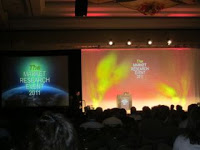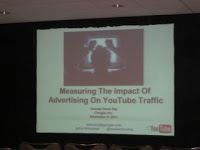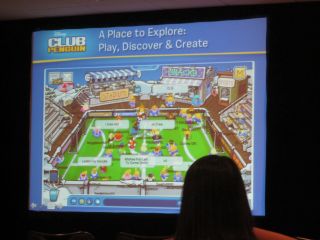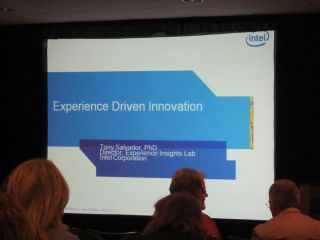Live from TMRE: Day 3 - what a day wth Intel, Disney, YouTube and Microsoft BING (and CIA)...

Could there
be another TMRE day tomorrow? Should there be one? Hmm, I think we all have to
go back to work and do interesting research stuff and thinking.
a lot of interesting thoughts back with me to Germany. I saw a lot of
interesting sessions and talked to a lot of interesting people (some which I
only knew from Twitter). But before I'll have to leave I would like to share my
thoughts on this third day of TMRE.
the day with the two keynotes, 'Why Bad Behaviour Is Good Politics by Bruce
Bueno'.
are deadlier in Iran or China than Chile, Honduras or Italy'
world's top universities are in democracies'
exported baby formula and food in the 90s while over 500.000 of its children
died needlessly from malnutrition and disease'
another quiz:
job security? Huge income? The need to do want you want? Everyone should praise
you? Looking for perfect job privacy balance? Become a dictator! :-)
drilled it down to five rules, applicable for all organizations (families,
charities, companies etc.)
successful dictator rely only on as few people as possible, only use a small
coalition of supporters
'coalition' of people and drawn them from a large pool of people, the larger
the better. It is important that they know that they can be are easily
replaced.
out of customers as much as possible.
coalition just enough so they don't think to switch to the other side. But don't
pay more than that. If you pay them too
much, they are able to gain wealth and spend the money and at the end fights
you.
waste money on improving the lives of the people you rule. They aren't
important because you don't benefit from them at all
speech, but I didn't really get the connection to market research, promise to
think harder :-)
one was Jeremy Gutsche, founder of Trendhunter.com, again a very engaging
presentation. You could see that he is a 'man for the stage'.
about two different trends in recent times:
supremacy of culture
return of gut instinct (which we don't like that much ;-) )
out that market research used to be driven by product. But that isn't hitting
the nail anymore. It's about experience. Most of the companies sell products,
but consumers buy experiences (see Harley Davidson).
So, to his
point of view, we are hunting for the cool stuff, because cool stuff is unique,
cutting edge, viral, the next big thing' So you'll have to create a culture!
study about littering. See the answer from the research and the execution from
ad agency and goolge for 'Don't mess with Texas'. Here is the link.
Most
important notes for me: Create a connection to the research! Or connect the
research to an experience!
Then I went
to some cool sessions. YouTube, Disney, BING, Intel'
have instream ads, overlays, banner / rich media and promoted videos (yes, they
belong to google)
is incredibly growing. 3 billion views a day, 48 hours of videos uploaded every
day' Why is this important? It is, because they earn money with this. 2 billion
monetized views every week.
some experimental designs and found out that instream ads (those that are
running prior to the video you choose) are most disturbing the users. Not
surprising at all, because they stop you from doing what you want. This is
getting slightly better when the instream ad is skippable, but this kind of
advertising remains one of the most critical issues in terms of usage and
visiting YouTube. But be sure they will react
on this.
heard some inspiring words about culture in a creative organization from Yoni
Karpfen, Consumer Research Club Penguin (Disney). It was very impressive to see
how children aged 6 to 12 deal with daily politics in a playful way (like 9/11,
breast cancer day or Japan tragedy).
kind of product need perpetual creative development and the question is how to
do this and what to develop next? Yoni led us through their research process
which delivers a highly creative experience. They listen to the players, live
and breathe the experience. And they have a huge community support team which
is connected to the users anytime.
to make research free or cheap instead of expensive, fast instead of slow, friendly
instead of controversial, trustworthy instead of questionable, tailored to the
audience instead of complicated and cool & fun instead of boring. And of
course they have to in order to fuel the creative network and their core
business'
Inspiration meets information, creative has to be compatible to operational.
Empathy is the key, and that itself refers to culture.
Bing is measuring social network conversation and WoM to understand how Gen Y
is talking about their brand to get more emotional connection insights of
Generation Y. They better do, because 10.1% of Gen Y visits MSN.com on a
monthly basis. So MSN and Bing's target for 2011 has been Gen Y for all their
media spend & targeting. It is a little bit confusing, because Lise Nicole
Brende told us that the Bing research team mainly consists of Gen X
researchers. So how can Gen X researchers deep dive into the habits and rituals
of Gen Y (but this is another story').
their attention towards so called Connected Socialiszers (Facebook centric) which
produce 47% of all BING searches. In former time they focused on Information
Seekers (responsible for 20% of BING searches).
lot about Gen Y then, taken from the Cassandra Report, and how BING tries to
adopt these findings. They constantly try to get in touch with this optimistic,
control demanding, group oriented and sometimes overwhelmed and stressed Gen Y.
One of the key assets BING has is Gen Y trend seeker panel, providing feedback to
them, a very interesting and valuable source.
not least I attended the session by Intel about Experience Driven Innovation.
It was again very interesting and presented on a high level. Tony Salvador was pointing out that Intel is looking
for long term evolution trends to use for corporate development. He said that
experience that is based on data is future. It delivers new ways of business,
new way of making money, new ways of interacting. And he left us with 5 take
aways:
drives markets
markets are comprised of people
values and they seek value
complexity is right there
values in Flux drive Expertise
say good-bye for now. See you later! Don't forget to follow me on twitter
@olympiamilano :-)
more check out the gorgeous twitter hashtag #TMRE
About the author: Christian Dssel is blogging about market research in German language here and here.
After having worked for TNS, TBWA and other strategy and market
research agencies he now holds the position of Senior Research Director
at MM-Eye in Hamburg / Germany with special responsibilities for MM-Eye's new media and online research approaches.



